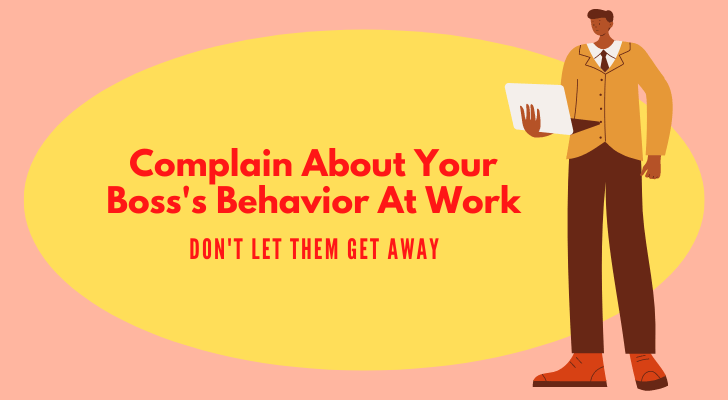Everyone has had to deal with a difficult boss at least once in their lifetime. Whether it's rude comments, unrealistic expectations or just plain unfairness, being treated badly by your boss can take its toll. It can be hard to know when and how to complain about your bosses' behavior - especially if you feel powerless and want to keep your job.
Don’t stay silent. Fight for your dignity and fight for your rights. If you want to leave, leave, but make sure you get all you want before you leave. Don’t let your boss’s or anyone’s bad behavior affects your life.
So let’s find out the best ways of complaining about your boss's behavior at work in order to get the results you deserve. Read on for advice on how to make sure that your complaint is heard in a professional manner - and what actions you may need to take afterwards.

Your Vulnerable Position at Work
“Bullying and harassment” - the policy may be set out by your employer and your HR managers may be well-trained. So everything may appear to be under control, your support is there, and your position is protected. On paper.
But when an actual problem arises, things can become your words and actions against theirs. And your vulnerable position can be unfairly overlooked.
Imagine every time your boss talks to you, they make you feel uncomfortable. They’re not intimidating you, but you feel intimidated. This goes on for a long period of time. When it becomes too much, you speak up. But by this point, you are psychologically damaged and cannot express the situation well from your viewpoint. Whereas your boss can use their power to manipulate the reconciliation process.
Your HR managers don’t see it - instead, they stick to the guideline, pick one or two incidents and decide that they’re not under the “bully and harassment” bracket. Case closed.
Such s problem can have very unhealthy consequences for both the victim and the workplace as a whole.
“Harassments”
Harassment can take many forms, including verbal abuse, threats, intimidation, and isolation. Bosses’ manipulative behaviors can turn extremely intimidating over a period of time.
Victims of workplace harassment may suffer from anxiety, depression, and even post-traumatic stress disorder. In severe cases, workplace harassment can lead to suicide.
These behaviors are usually perpetrated by those in positions of power, such as supervisors or managers. Harassments are often motivated by a desire to control or degrade the victim.
Your Boss's Unacceptable Behaviors

Your boss's unacceptable behaviors can include, but are not limited to:
- Making demeaning or derogatory comments about you or your work.
- Raising their voice (not just yelling or screaming.)
- Using abusive language (not just swearing or using discriminatory words, but using words that you don’t feel acceptable.)
- Making sexual comments about you or your colleagues.
- Using intimidation tactics designed to make you feel scared or helpless.
- Telling you off in front of others is a bully. Don’t forget that!
- It doesn’t mean they can put you aside and hiss at you. That would be another unprofessional behavior that you can complain about.
- Needless to say - any form of physical threats (throwing/smashing things or engaging in destructive behavior.)
By the way, if your boss physically harms you, you can contact the police before you contact the HR manager or anyone else in a senior position. Because the moment there’s physical contact, it’s no longer an internal issue but it’s a criminal offence. Keep that in mind.
How to Effectively Complain About Your Boss's Behavior
If you feel that your work life is miserable because of your boss, then get ready to speak up and do whatever it takes to sort that out. Don’t let it be brushed under the carpet because you don’t deserve it. Seriously, your life owes it to you! Here are the steps you can take.
Write Down What You Want To Say

This is important. Because the words you’ve written down yourself will keep you stay calm (although they may make your blood boil again!) and help you look at things again from an objective viewpoint.
“I think my boss is being unfair, but am I being fair? Do I contribute my full efforts to this company?”
Write down the following;
- List all the incidents with date & time. What your boss said to you and what you said to them. Make each one as short as possible but to the point.
- The reasons you think you’re being treated unfairly.
- The reasons you feel you’re stuck.
Be as a matter of fact as you can. For example, you are scared of confronting your boss, or there were things you wanted to say but you missed the timing and you couldn’t.
They may say “Why didn’t you tell us earlier!?” as if it’s your fault. No, it is not your weakness or fault, it’s your personality and the timing issues that they (your seniors) have to understand and respect.
Write Down What You’re NOT Going To Say
This is purely to get your thoughts in order and review your complaint objectively.
The reasons you think your boss behaved that way
Maybe they thought it was in your or the company's best interest. This is only your speculation and it’s none of your business. So don’t say it at the formal complaint procedure.
Your weaknesses
maybe there was a situation you couldn’t handle well, and maybe it was partly your fault. Write it down but don’t say it. As mentioned above, it’s the seniors’ job to handle the juniors’ personalities delicately and protect their positions. You were not wrong. They were.
Join a Trade Union
If you haven’t already, join a trade union of your choice because you have the legal right to.
You may have complained about your boss to your colleagues, friends, and family members and received all sorts of advice and encouragement. Their advice may help you emotionally, but not necessarily help you take the most appropriate course of action when taking your complaint formally.
You’ll have to pay a small membership fee, but having a union manager is like having a lawyer - they are on your side. They will listen to you, give you advice and point you in the right direction.
Don’t Be Afraid To Take a Sick Leave
How many days you can take a paid sick leave depends on your employment of contract - if any. Also depends on the employment law in your country. You may be reading this right now because you don’t like confrontation. So take advantage of your sick leave and plan your ‘revenge’ from home.
- You know what to do to start with - go see your doctor and get a certificate, and tell your boss that you’re taking a sick leave due to the stress.
- Tell whoever is appropriate (the HR department or the boss of your boss in question) that you are unable to work because of your boss specifically. Explain the situation over the phone or via email.
- Offer a solution - tell them what you want them to do. You want them to relocate you to a different department, relocate your boss elsewhere, or you want to quit.
Reject a Formal Meeting

Your HR manager may invite you to a formal meeting to discuss the problem further. A meeting may help them understand the situation further and get to the bottom of it. So if you are happy, accept the invite and tell them that your trade union representative will be with you.
If you’re not happy with their suggestion, don’t be afraid to reject it and tell them that you will only communicate via email, Zoom, or whatever you feel most comfortable with.
- If the HR manager insists that a face-to-face meeting is mandatory, tell them it’s not! It’s not written in the contract of employment.
- If they say that you’ll be in a weaker position if you don’t attend a meeting, (1) ask them why exactly, and (2) tell them that their suggestion is blackmail.
Tell them that you feel the full investigation can be done and must be done electronically. Tell them that this is important for you to protect yourself from further mental stress.
Will Your Complaint Backfire?
“Oh, you should try and speak to your boss directly and see if you can resolve the issue between the two of you.” Pretty useless advice, isn’t it?
You’re reading this because you can’t speak to them directly. But you want to be heard and respected. You would quit today if you could, but Mama Madonna is right - she said, "If you let people get away with bad behavior, they're going to do it again."
So will your complaint about your boss’s behavior backfire on you? If you’re making a complaint and still expecting to work with your boss together, yes, it may. Even if you’re separated from your boss;
- Other managers may view you as a troublemaker, making it hard for you to be considered for promotions in the future.
- Your formal complaint may affect your colleagues’ opinion of you. They may distance themselves from you, making you feel like an outsider in your own workplace.
There’s no magic answer here. If you are ready to move on - find a new job, complain, and quit - then it’s good, but things don’t always work out that way.
Speak to your union representative and see what they say. It’s not like they have the best answer for you either, but at least their advice based on a fair judgment will help you decide what you really want to do.
If They Cannot Resolve The Issue
If your HR department is not on your side or does resolve your complaint in your favor, it’s time to take the complaint outside the company.
If you are in the US, U.S. Equal Employment Opportunity Commission is the place to contact. If you’re in the UK, Employment Tribunal. Remember to document all the communications you’ve had with HR before you contact them.
